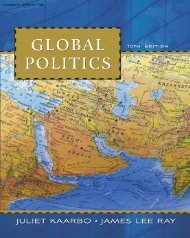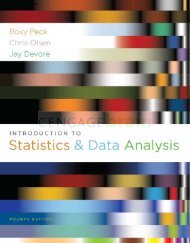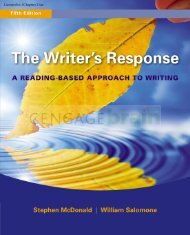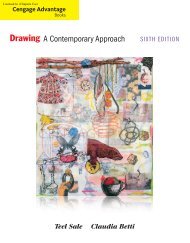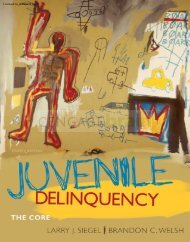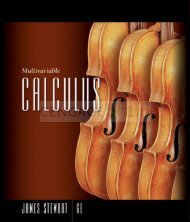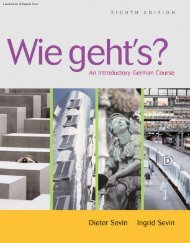Understanding Statistics in the Behavioral Sciences ... - NelsonBrain
Understanding Statistics in the Behavioral Sciences ... - NelsonBrain
Understanding Statistics in the Behavioral Sciences ... - NelsonBrain
You also want an ePaper? Increase the reach of your titles
YUMPU automatically turns print PDFs into web optimized ePapers that Google loves.
Licensed to:<br />
16 C H A P T E R 1 <strong>Statistics</strong> and Scientifi c Method<br />
WHAT IS THE TRUTH? (cont<strong>in</strong>ued)<br />
It is, however, what <strong>the</strong> May 29<br />
press release announc<strong>in</strong>g <strong>the</strong> poll’s<br />
fi nd<strong>in</strong>gs said. In fact, its fi rst paragraph<br />
read: “Almost two-thirds of<br />
Americans th<strong>in</strong>k Karl Marx’s maxim,<br />
‘From each accord<strong>in</strong>g to his ability, to<br />
each accord<strong>in</strong>g to his needs’ was or<br />
could have been written by <strong>the</strong> framers<br />
and <strong>in</strong>cluded <strong>in</strong> <strong>the</strong> Constitution.”<br />
Note <strong>the</strong> subtle shift from <strong>the</strong><br />
release’s “could have been written”<br />
to Cole’s—or his speech writer’s—<br />
”may have been written.”<br />
The announcement’s second<br />
paragraph quotes Columbia Law<br />
School professor Michael Dorf on<br />
<strong>the</strong> troubl<strong>in</strong>g implications of <strong>the</strong><br />
Marx “fi nd<strong>in</strong>g” and po<strong>in</strong>ts <strong>the</strong> reader<br />
to a column <strong>the</strong> professor has written<br />
for a legal Web site, F<strong>in</strong>dlaw.<br />
com. In that column, Dorf wrote that<br />
“The survey found that 69 percent<br />
of respondents ei<strong>the</strong>r thought that<br />
<strong>the</strong> United States Constitution<br />
conta<strong>in</strong>ed Marx’s maxim, or did not<br />
know whe<strong>the</strong>r or not it did.”<br />
That is fur<strong>the</strong>r still from Cole’s<br />
recitation of <strong>the</strong> fi nd<strong>in</strong>g.<br />
What of <strong>the</strong> actual poll, which<br />
asked a national sample of 1,000<br />
respondents fi ve yes-or-no questions<br />
about <strong>the</strong> Constitution?<br />
In response to <strong>the</strong> query about<br />
whe<strong>the</strong>r <strong>the</strong> Marxist maxim is conta<strong>in</strong>ed<br />
<strong>in</strong> <strong>the</strong> document, 35 percent<br />
said yes; 31 percent said no; and<br />
34 percent said “<strong>the</strong>y did not know.”<br />
Was Dorf entitled to confl ate<br />
<strong>the</strong> yes and don’t-know respondents<br />
<strong>in</strong>to a s<strong>in</strong>gle, alarm<strong>in</strong>g two-thirds?<br />
No, Schneider said. “That is a total<br />
mis<strong>in</strong>terpretation of what people<br />
mean when <strong>the</strong>y tell a pollster <strong>the</strong>y<br />
don’t know. When people say that,<br />
<strong>the</strong>y mean ‘I have no idea.’ Choos<strong>in</strong>g<br />
to <strong>in</strong>terpret it as mean<strong>in</strong>g ‘I th<strong>in</strong>k<br />
it may be true or could be true’<br />
simply is mislead<strong>in</strong>g on <strong>the</strong> writer’s<br />
part.”<br />
What it does do is add pungency<br />
to a fi nd<strong>in</strong>g Schneider described<br />
as “wholly unremarkable. It’s not at<br />
all surpris<strong>in</strong>g that about a third of<br />
respondents thought that is <strong>in</strong> <strong>the</strong><br />
Constitution. Most people, for example,<br />
th<strong>in</strong>k <strong>the</strong> right to privacy exists <strong>in</strong><br />
<strong>the</strong> Constitution, when no such right<br />
is enumerated anywhere <strong>in</strong> it.”<br />
In fact, what is remarkable—<br />
and far more relevant at <strong>the</strong><br />
moment—about <strong>the</strong> Columbia<br />
poll is what it shows Americans<br />
do know about <strong>the</strong>ir Constitution:<br />
Fully 83 percent of <strong>the</strong> respondents<br />
recognized <strong>the</strong> fi rst sentence of <strong>the</strong><br />
14th Amendment as part of <strong>the</strong><br />
national charter, while 60 percent<br />
correctly understood that <strong>the</strong><br />
president may not suspend <strong>the</strong><br />
Bill of Rights <strong>in</strong> time of war.<br />
More than two-thirds of those<br />
asked were aware that Supreme<br />
Court justices serve for life.<br />
The only o<strong>the</strong>r question <strong>the</strong><br />
respondents fl ubbed was whe<strong>the</strong>r<br />
<strong>the</strong> court’s overturn<strong>in</strong>g of Roe vs.<br />
Wade would make abortion “illegal<br />
throughout <strong>the</strong> United States.”<br />
Fewer than a third of those<br />
polled correctly said it would not,<br />
because state statutes guarantee<strong>in</strong>g<br />
choice would rema<strong>in</strong> on <strong>the</strong> books.<br />
These facts notwithstand<strong>in</strong>g,<br />
it is a safe bet that radio and<br />
television talk-show hosts, editorial<br />
writers and all <strong>the</strong> rest of <strong>the</strong> usually<br />
suspect soon will be sigh<strong>in</strong>g, groan<strong>in</strong>g,<br />
sneer<strong>in</strong>g and rag<strong>in</strong>g about<br />
Americans’ <strong>in</strong>ability to dist<strong>in</strong>guish<br />
<strong>the</strong> thought of James Madison from<br />
that of Karl Marx. How long will it be<br />
before public education, <strong>the</strong> liberal<br />
media, humanism and s<strong>in</strong>gle-parent<br />
families are blamed?<br />
Commentary pages are <strong>the</strong><br />
soft underbelly of American journalism.<br />
Their writers, however self<strong>in</strong>terested,<br />
are held to a different,<br />
which is to say lower, standard of<br />
proof because of <strong>the</strong>ir presumed<br />
expertise.<br />
In fact, <strong>the</strong>y are responsible<br />
for regularly <strong>in</strong>ject<strong>in</strong>g false <strong>in</strong>formation<br />
of this sort <strong>in</strong>to our public<br />
discourse. In <strong>the</strong> marketplace of<br />
ideas, as on <strong>the</strong> used car lot, caveat<br />
emptor still is <strong>the</strong> best policy.<br />
Source: “Regard<strong>in</strong>g Media: Survey<strong>in</strong>g<br />
a Problem with Polls” by Tim Rutten,<br />
Los Angeles Times, June 14, 2002.<br />
Copyright © 2002 Los Angeles Times.<br />
Repr<strong>in</strong>ted with permission.<br />
Do you th<strong>in</strong>k William Schneider<br />
is too cynical, or do you agree with<br />
<strong>the</strong> article’s conclusion? “In fact,<br />
<strong>the</strong>y are responsible for regularly<br />
<strong>in</strong>ject<strong>in</strong>g false <strong>in</strong>formation of this<br />
sort <strong>in</strong>to our public discourse. In<br />
<strong>the</strong> marketplace of ideas, as on <strong>the</strong><br />
used car lot, caveat emptor still is<br />
<strong>the</strong> best policy.” ■<br />
Copyright 2011 Cengage Learn<strong>in</strong>g. All Rights Reserved. May not be copied, scanned, or duplicated, <strong>in</strong> whole or <strong>in</strong> part. Due to electronic rights, some third party content may be suppressed from <strong>the</strong> eBook and/or eChapter(s).<br />
Editorial review has deemed that any suppressed content does not materially affect <strong>the</strong> overall learn<strong>in</strong>g experience. Cengage Learn<strong>in</strong>g reserves <strong>the</strong> right to remove additional content at any time if subsequent rights restrictions require it.



